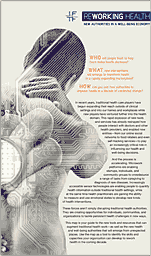Future Now
The IFTF Blog
Reworking Health: Personalizing Space for Mindfulness
Ambient Authority: Leveraging Environments for Health
At IFTF, we’ve been writing for a while now about all the ways that our environments impact our health and well-being. From spaces that nudge us towards healthy (or unhealthy behavior), to sunlight and air’s direct impact on our bodies, to disturbing links between zip codes and life expectancy, the body of evidence that place matters seems to be growing everyday. In a decade, then, it seems a forgone conclusion that we’ll see efforts to leverage the environment for our health.
But while this new approach holds the potential to take the heavy lifting of health off of the individual and outsource it to the environment, it also poses the risk of taking away people’s agency. When we explored the concept of shifting sources of authority in health last year—basically, who we’ll look to for help understanding and managing our health and well-being—we came to the realization that, in the future, every design decision will essentially be a health and well-being decision. For instance, Delos Living, a pioneer of what they call “Wellness Real Estate,” has mapped out all the ways that we can design our environments for optimal health benefits, from designing cabinets for healthy eating, to changing lighting and airflow systems to have greater impact on our physical and mental health.
This means that whoever designs our environments will have substantial control over our health. In fact, they already do. For instance, Google has designed some of its cafeterias to influence people’s health behavior and early results indicate they’ve been successful. And while most of us wouldn’t object having our spaces redesigned for health promotion, there will always be tradeoffs, and people are likely to feel disempowered if they don’t have input into how those tradeoffs are managed. Our forecast, “Personalizing Space for Mindfulness,” addresses this exact tension.
Essentially, what this means is that, in a decade, we’re likely to see the emergence of new tools and platforms for personalizing space in a way that both allows people to offload some of the burden of health-management onto the environment, but also gives them control over what to optimize for and what to sacrifice. This kind of approach has the additional benefit of allowing people to be engaged in, and mindful about, their health.
If you’re interested in this shift towards enlisting environments to enhance and manage our health and well-being, you can check out our fall conference, A Health Aware World.
In our 2013 Health Horizons research, Reworking Health, we examined four emerging sources of authority—computation, narratives, networks, and ambience—that will fundamentally transform who we trust and what interventions will be available in a rapidly expanding health and well-being marketplace.
This series of blog posts dives into the map's forecasts to reveal new opportunities and help you imagine what skills and capacities you or your organization can develop to rework health in the coming decade:
- Embedding Care Protocol Adherence
- Automating Media Therapy
- Amplifying the Positive
- Commoditizing Bodywork
- Optimizing the Care Effect
- Uncovering Empowering Identities
- Coordinating Caring Communities
- Calibrating Pain
- Contextualizing Science in Retail Settings
About IFTF's Health Horizons Program
- Contact Dawn Alva at dalva@iftf.org or 650-233-9585




